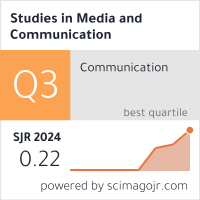The Relationship Between Social Media Usage and Responses to Hoax and Hate Speech in Padang
Abstract
The popularity of social media in Indonesia is currently on the rise, and recent trends indicate that social media usage is associated with the dissemination of various factors contributing to the development of news and information within society. Most social media users utilize their social networks to meet their news needs, even though these sources are not always accurately verifiable. Unfortunately, there is a significant amount of misinformation and hate speech found on social media, compounded by the low media literacy rates in Indonesia, leading to rapid and widespread dissemination of information. This study aims to analyze the relationship between individual behavior in consuming media (media consumption) and their responses to hoax and hate speech on social media. The theory employed is selective exposure. The research method used is a quantitative approach utilizing correlational research methods. Sampling was conducted using a questionnaire, selecting two districts as the research sample through simple random sampling. The total number of respondents included in this study was 110, determined based on Taro Yamane's formula with a precision/tolerance error of 10%. The research findings indicate that the majority of respondents emphasize the importance of selecting information free from negative content such as insults, hate speech, and fake news on social media platforms. Significant differences in respondent perspectives reflect variations in the assessment of accessed information, while differing opinions regarding the validity and freedom of information from certain negative elements are also evident in this study. Some respondents exhibit uncertainty regarding the objectivity and consistency between titles and content of information obtained through social media. The analysis reveals a connection between the intensity of social media usage and respondents' reactions to hoax and hate speech information. Although the relationship is relatively weak, it indicates an association between the frequency of social media usage and the way respondents respond to information containing hoaxes or hate speech.
Full Text:
PDFDOI: https://doi.org/10.11114/smc.v12i3.6682
Refbacks
- There are currently no refbacks.
Studies in Media and Communication ISSN 2325-8071 (Print) ISSN 2325-808X (Online)
Copyright © Redfame Publishing Inc.
To make sure that you can receive messages from us, please add the 'redfame.com' domain to your e-mail 'safe list'. If you do not receive e-mail in your 'inbox', check your 'bulk mail' or 'junk mail' folders.
If you have any questions, please contact: smc@redfame.com
------------------------------------------------------------------------------------------------------------------------------------------------------

